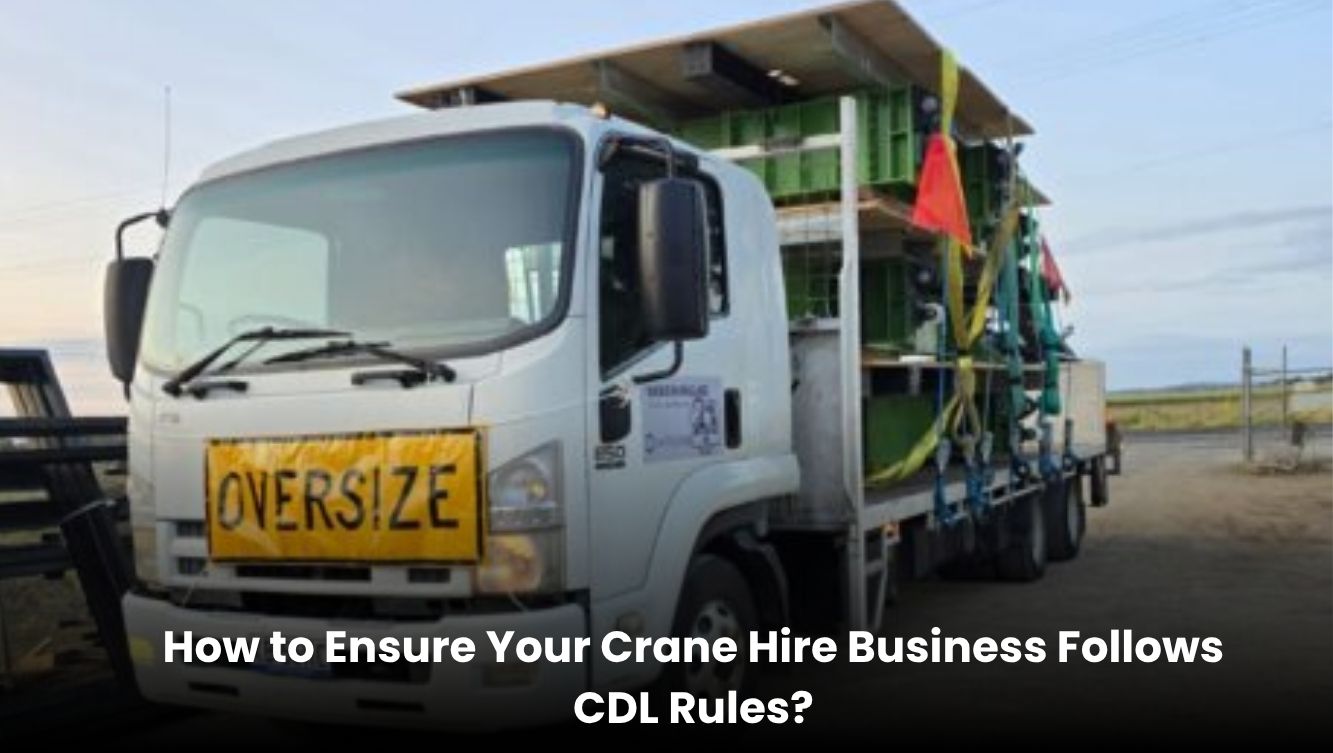How to Ensure Your Crane Hire Business Follows CDL Rules?
In the crane hire and heavy equipment transport industry, having the correct Commercial Driver’s License (CDL) is not just a formality—it’s a legal requirement. CDL licenses are designed to ensure that drivers operating large, heavy, or complex vehicles, such as crane trucks and transport trailers, are properly trained and certified. Without a valid Commercial Driver’s License, a driver is not legally permitted to handle these vehicles on public roads, and any business that allows it risks fines, penalties, and serious safety violations.
For crane hire companies, ensuring that all drivers and operators hold the appropriate Commercial Driver’s License is a basic but essential part of running a safe and compliant operation. It helps prevent accidents, protects your company from liability, and builds credibility with clients who expect professional, law-abiding service providers. This blog explains what Commercial Driver’s License licenses are, which types apply to crane operations, and how your business can meet all necessary CDL rules and regulations.
What is a CDL (Commercial Driver’s License)?
A Commercial Driver’s License is a special license required for individuals who operate heavy, large, or hazardous vehicles for commercial use. While private drivers use a standard license, It holders undergo advanced testing to ensure they can safely control vehicles with complex mechanics, extended loads, and elevated road risks.
In Australia, licensing falls under the Heavy Vehicle National Law (HVNL), administered by the National Heavy Vehicle Regulator (NHVR). The system categorizes licenses by vehicle class and load capacity, aligning with the same principles as the U.S. CDL system.
Who Needs a CDL?
Anyone who drives a:
- Crane truck
- Heavy haulage vehicle
- Flatbed trailer carrying construction equipment
- Oversized load escort vehicle
…needs a license that matches the class and complexity of that vehicle.
A CDL is about more than driving — it’s about demonstrated knowledge of braking systems, load balance, road safety laws, and emergency response.
Types of CDL Licenses…
Different cranes and trucks call for different levels of expertise — and that’s where the CDL classes come in. Here’s a breakdown that matters specifically for your crane hire Service:
Class A — For Flatbeds & Combination Vehicles
- Allows operation of vehicles with a Gross Combination Mass (GCM) of over 9,000 kg
- Covers articulated trucks, low loaders, and flatbed rigs
- Essential for transporting cranes, excavators, or large site equipment across regions
Use Case for HNH Crane: If you offer equipment transport services with trailers or heavy hauls, Class A drivers are a non-negotiable requirement.
Class B — For Single Vehicles Like Crane Trucks
- For vehicles over 8,000 kg GVM (Gross Vehicle Mass), not towing large trailers
- Includes rigid-frame crane trucks, dump trucks, and concrete pumps
- Most commonly required CDL for urban crane deployment
Use Case for HNH Crane: Your crane truck drivers, especially those delivering onsite crane services, must hold at least a Class B license.
Class C — For Light Commercial Use
- Covers smaller commercial vehicles or vehicles transporting hazardous materials
- Less relevant for crane hire, but necessary for escort vehicles or company utility vans
Important Note: Some crane operations may require special endorsements in addition to standard CDL classes — for example, oversized vehicle permits or boom control certifications.
How to Ensure CDL Compliance in Your Crane Hire Company
You’ve got trucks. You’ve got cranes. But do you have the right people behind the wheel?
Hire Only Certified Drivers
- Ask for verified CDL documentation before on boarding
- Ensure the license class matches the vehicle type
- Conduct license re-checks every 6–12 months
Verify with Licensing Authorities
- Use the NHVR database to confirm license validity
- Look out for restrictions, suspensions, or expired certifications
Train Beyond the License
- CDL is the minimum. Go further with in-house safety training, crane-specific operation courses, and road hazard management
- Require operators to attend refreshers, especially when regulations change
Stay Updated on Regulation Changes
- Follow NHVR, state transport authorities, and industry publications
- Changes in load limits, escort rules, or road access permits can affect license requirements
Penalties for Non-Compliance
Operating without CDL compliance isn’t just a red tape issue — it’s a potential financial and legal disaster.
Legal & Financial Consequences
- Fines up to $20,000 or more for operating heavy vehicles without proper licensing
- Court orders or suspension of business operations
- Insurance voids in case of accidents involving unlicensed drivers
Reputational Damage
- Clients lose trust when legal breaches make headlines
- Loss of contracts with government or corporate clients who demand full compliance
Safety Risks
- CDL training includes emergency control techniques — skipping that training increases accident risks
- One mistake from an unlicensed driver can cause property damage, injuries, or fatalities
CDL Rules vs Crane Operation Certifications: Know the Difference
Many crane businesses confuse CDL licensing with crane operator certification, but they’re not interchangeable.
CDL = For Driving the Truck
- Grants legal authority to operate the vehicle on public roads
- Focuses on safe vehicle handling and road law knowledge
Crane Operation Certificate = For Operating the Crane
- Covers operation of crane mechanisms like boom, hoist, swing, and load movement
- Often governed by WorkSafe or state-specific safety regulators
When Are Both Required?
If your crane operator also drives the crane truck to the site, they must hold:
- A Class B CDL (or appropriate class based on weight)
- A High-Risk Work License (HRWL) for crane operation (e.g., slewing mobile crane license)
Read More: crane hire in Gold Coast
Why Customers Should Choose CDL-Compliant Crane Hire Companies
From a client’s perspective, working with a CDL-compliant provider means peace of mind.
Builds Trust and Professionalism
- Compliance shows commitment to industry best practices
- Shows you take your work seriously — and that you’re not cutting corners
Reduces Liability
- In case of an accident, hiring a compliant provider shifts liability away from the client
- Reduces exposure to project delays caused by legal violations
Ensures Site Safety and Efficiency
- Licensed drivers are trained for load control, blind spots, and risk zones
- Faster job completion with fewer errors and less rework
Pro Tip for Customers: Always ask for license verification from your crane provider. It’s your right and your protection.
How HNH Crane Ensures CDL Compliance
At HNH Crane, CDL compliance is not just a box to check — it’s part of our DNA.
Qualified & Verified Team
- Every operator and driver undergoes a license verification process upon hiring
- Licenses are cross-checked with transport authorities before deployment
Safety-First Culture
- All team members are trained in advanced road safety, crane operations, and emergency protocols
- Regular toolbox talks and site inductions keep our crew sharp and compliant
Compliance Management System
- Our internal system flags upcoming license renewals, training refreshers, and policy changes
- Clients are provided full documentation of our credentials before every project
When you hire HNH Crane, you’re not just hiring a crane — you’re hiring a fully licensed, regulation-ready partner who takes compliance as seriously as you do.
CDL compliance isn’t just about avoiding fines — it’s about building a responsible, trustworthy, and future-ready crane hire business. Whether you’re transporting machinery, operating mobile cranes, or navigating complex construction sites, having properly licensed drivers is non-negotiable.
Your clients depend on you to be safe. The law demands you to be compliant. And your business needs to be smart.
- Review your team’s licenses.
Invest in training.
Choose partners who value compliance as much as you do.
Looking for a crane hire company that meets all CDL and safety standards?
Contact HNH Crane — where expertise meets legal excellence.


Comments are closed